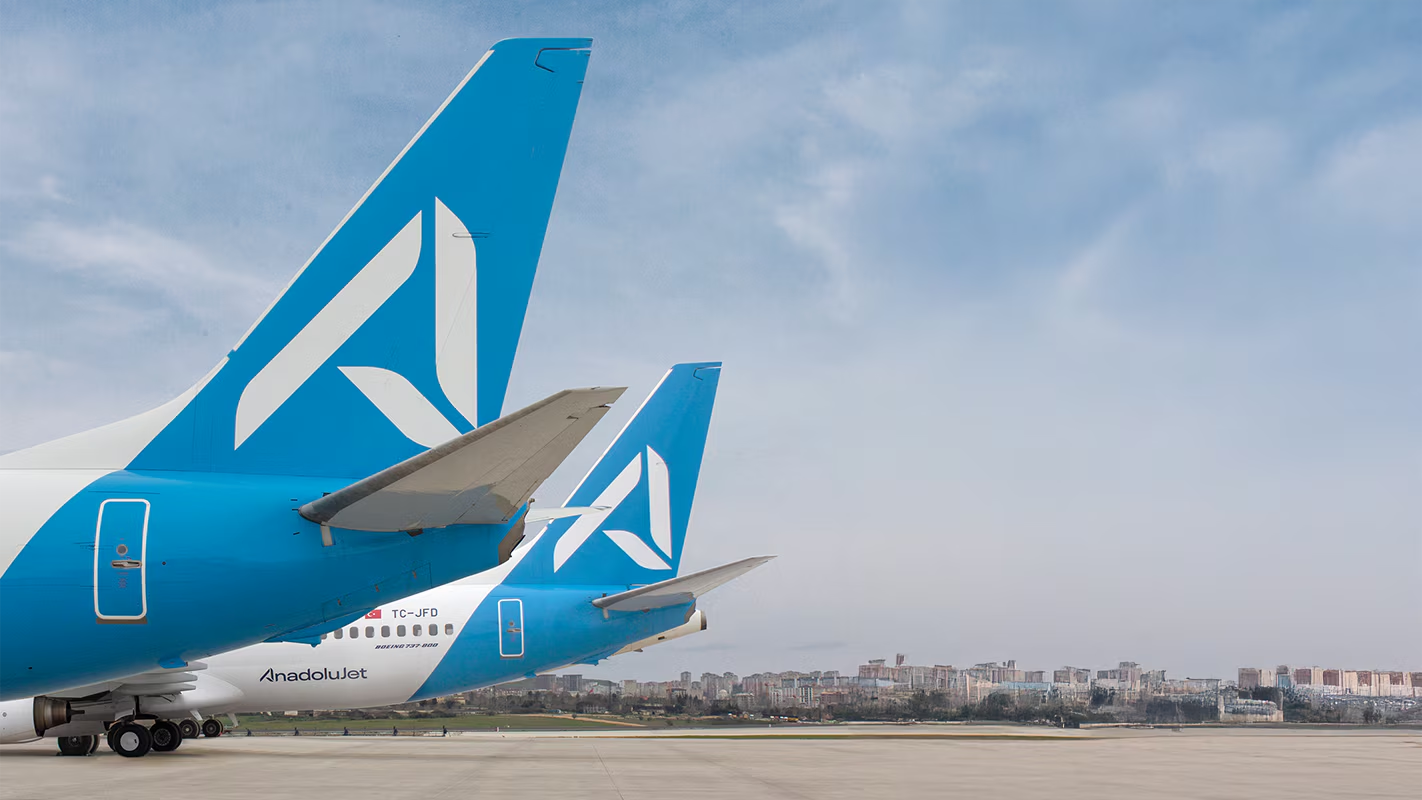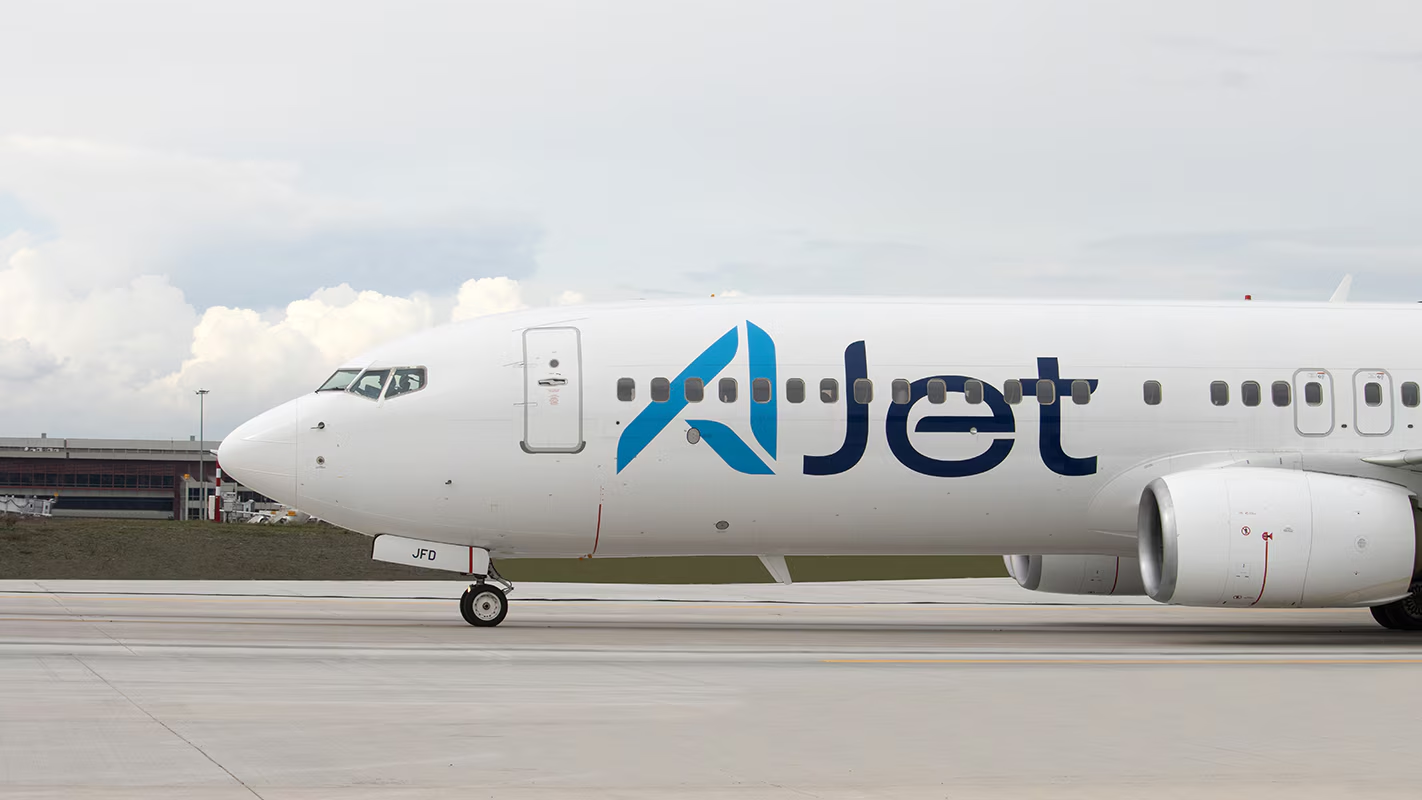AJet, the low-cost carrier owned by Turkish Airlines, has received its first two Boeing 737 Max 8 aircraft from lessor CDB Aviation. The delivery is part of a 12-aircraft fleet expansion scheduled between 2025 and 2026.
 AJet Boeing 737 Max 8 aircraft parked © AJet
AJet Boeing 737 Max 8 aircraft parked © AJet
737 Max 8 Delivers Efficiency and Range for AJet Budget Model
AJet’s acquisition of new Boeing 737 Max 8 aircraft standardises its fleet with modern planes that offer fuel efficiency, lower operating costs, and advanced technology, features that are non-negotiable for running an efficient and competitive low-cost airline model.
The carrier’s long-term development strategy includes further integrating next-generation aircraft into its fleet over the coming years. Under a 2023 deal with CDB Aviation, a subsidiary of China Development Bank Financial Leasing, AJet will lease 12 Boeing 737 Max 8 aircraft by 2026, with plans to expand its fleet to 200 aircraft by 2033.
The airline’s also envisioned to standardise its fleet, with 90% comprised of modern Airbus A320neo (read more here),and Boeing 737 Max jets by 2027. The shift is aimed at reducing reliance on wet-leased aircraft and giving the carrier greater control over fleet management.
Benefits of acquiring Boeing 737 Max 8 aicraft:
-
Fuel Efficiency: Boeing estimates a 14% reduction in fuel burn compared to the 737-800 Next Generation (NG) models for example, thanks to the LEAP-1B engines and aerodynamic improvements.
-
Lower Carbon Footprint: The MAX 8’s enhanced fuel efficiency emits less CO₂ emissions and a quieter operational footprint
-
Range & Capacity: The MAX 8 has a range of up to 3,500 nautical miles and can seat up to 210 passengers in a single-class configuration, allowing for network expansion and lower seat-mile costs .
-
Passenger Experience: Features such as the spacious Boeing Sky Interior, with LED lighting and larger overhead bins, enhance passenger comfort .
-
Advanced Flight Deck: The MAX 8 incorporates advanced avionics and flight deck technology, improving operational efficiency and safety .
-
Lower Maintenance Costs: Designed for easier airframe maintenance, the MAX 8 reduces turnaround times and operational expenses .

AJet Joining the Low-Cost Airline Trend
AJet, formerly AnadoluJet, was rebranded in April 2024 and is now a fully owned subsidiary of Turkish Airlines. The move mirrors not just Boeing 737 Max acquisitions but also a broader trend among legacy carriers, which have launched low-cost extensions such as Lufthansa’s Eurowings and Air France’s Transavia. The airline’s long-term strategic goals is to focus on all-economy class capture price-sensitive travellers while maintaining the Turkish Airlines premium brand image.
The low-cost airline, built on a no-frills model, focuses on cost efficiency with an all-economy configuration serving various European cities, Northern Cyprus, and Western Asia at lower fares. On Skyscanner, for example, a flight from London to Istanbul on 24 August 2025 was priced at £46 with AJet compared to £144 with Turkish Airlines, highlighting a steep price gap. While Turkish Airlines operates from major hubs such as Gatwick and Heathrow, AJet serves secondary airports such as London Stansted, considered less central for international travel but a key hub for low-cost airlines.
The low-cost carrier (LCC) market is significantly smaller than the legacy carrier market in terms of value but is dynamic and expanding rapidly. As of 2024, the LCC market accounted for 5.9 billion seats, 34% of global airline seats according to OAG Aviation. A 5% increased compared to 2019, pre-pandemic level according to their earlier research. Following this upward trend, LCC capacity is expected to grow in the coming years as low-cost services expand globally.
Cognitive Market Research estimated the global LCC market at $301,542.6 million in 2024 and expects it to reach $453,408.57 million by 2031. According to the analysis, Key market drivers include increased demand for affordable travel, a growing middle-class population, and rising disposable incomes, which afford a more flexible way to travel. Therefore, pivoting to or adding a low-cost extension to the main carrier makes sense from a business perspective.

Strengthening Turkey as a Regional Aviation Hub
The low-cost carrier has experienced a sharp growth in recent years, with is set to expand drastically, including the addition of the fuel-efficient Boeing 737 Max 8. Passenger numbers increased by nearly 1 million in the first half of 2024, reaching 10.2 million, alongside a 7% rise in overall capacity.
Reinforcing network connection internationally
According to AJet’s official website, the airline offered flights to 93 destinations (41 domestic and 52 international) in the summer of 2024, with 182 routes open for sale.
The carrier has been rapidly expanding its international network, adding key Middle Eastern destinations in October 2024, including Jeddah, Riyadh, Medina, and Dammam in Saudi Arabia, as well as Sharm El-Sheikh and Hurghada in Egypt, bringing its network to 95 destinations across 32 countries. It is now targeting the Spanish market, launching direct flights from Ankara to Madrid on October 23, and Barcelona on October 24, 2025, becoming the first carrier to connect the Turkish capital to these cities.
Reinforcing network connection within Turkey
AJet, operating as a feeder airline, runs a dual-hub network from Istanbul Sabiha Gökçen and Ankara Esenboğa. The carrier connects dozens of cities across Turkey, linking major tourism destinations such as Antalya, Bodrum, Izmir, and Trabzon with smaller regional airports. This extensive network supports both domestic travel and Turkey’s tourism industry, providing affordable access to coastal resorts, cultural landmarks, and historical sites.
Seeking international low-cost competition?
AJet has intensified competition with Pegasus on domestic and short-haul international routes from Istanbul Sabiha Gökçen Airport, operating similar routes. Leveraging its parent airline’s network, AJet is expanding routes and offering competitive fares, while Pegasus responds with international growth and operational efficiencies, underscoring a growing rivalry in Turkey’s low-cost aviation market.
With new Boeing 737 Max 8 aircraft and an expanding route network, AJet is on track to grow as a key low-cost carrier in Turkey, intensifying international competition. This provides value-seeking travellers with more smart, affordable, and modern connections across Europe, the Middle East, and beyond.
Stay updated on the latest low-cost fleet expansions and airline news with Travel Radar, and share your thoughts in the comments below.









